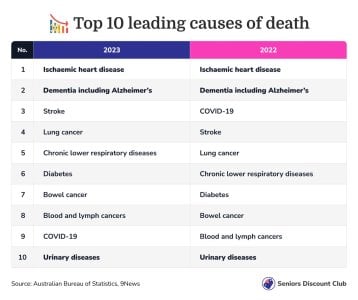Australia's leading cause of death to change for the first time in decades
By
Danielle F.
- Replies 13
Australia is on the cusp of a significant shift in public health trends since the 1960s.
For decades, ischaemic heart disease has been the leading cause of death in the country.
However, recent data from the Australian Bureau of Statistics (ABS) indicated that this could change soon.
In 2023, ischaemic heart disease accounted for 9.2 per cent of all deaths.
However, dementia, including Alzheimer's disease, was a close second at 9.1 per cent.
'The latest data shows that there are now less than 250 deaths separating the top two leading causes,' ABS's Head of Mortality Statistics Lauren Moran stated.
This shift was more than just statistics; it also reflected profound changes in the society and healthcare system—both of which hold significant implications for how people approach health and ageing.
Dementia has been the leading cause of death for Australian women since 2016.
'Women have longer life expectancies than men and are more likely to live to an age when they have a heightened risk of developing dementia,' Ms Moran added.
Now, it is the leading cause of death in South Australia, the Australian Capital Territory, and, for the first time, New South Wales.
The increase in dementia-related deaths has been partly attributed to the success in combating heart disease.
The mortality rate for heart disease has decreased by nearly 90 per cent within 50 years, thanks to medical and healthcare advancements.
Yet, with increased longevity also came a higher risk of developing age-related conditions like dementia.
The mortality rate for dementia has skyrocketed by almost 850 per cent over the same period.
This stark increase became a wake-up call to prioritise brain health and support for patients affected by dementia.
About 421,000 Australians are currently living with dementia.
Dementia Australia's projections suggested that this number could double by 2054.
'As dementia edges closer to becoming the leading cause of death of Australians, we must act now to focus on the brain health of the nation as well as provide more targeted, effective support to those impacted by dementia,' Dementia Australia's CEO, Professor Tanya Buchanan, insisted.
As the nation's brain health becomes a priority, advocates started calling for more targeted and effective support for those impacted by dementia.
This includes better treatment options, increased funding for research, and enhanced care services for individuals and their families.
While dementia is on the rise, COVID-19—the third largest cause of death in 2022—fell to ninth place last year.
This drop reflected the success of vaccination campaigns and public health measures.
However, suicide remains the leading cause of premature death.
With over 3,000 lives lost to suicide, it's a stark reminder of the importance of mental health support and services across the country.
We encourage everyone to talk about brain health, seek regular medical advice, and support organisations that are working towards a future where dementia and other diseases no longer dominate our health landscape.

If you or someone you know is affected by dementia or mental health issues, support is always available.
Reach out to Lifeline on 13 11 14 or Beyond Blue on 1300 22 4636 for assistance.
For decades, ischaemic heart disease has been the leading cause of death in the country.
However, recent data from the Australian Bureau of Statistics (ABS) indicated that this could change soon.
In 2023, ischaemic heart disease accounted for 9.2 per cent of all deaths.
However, dementia, including Alzheimer's disease, was a close second at 9.1 per cent.
'The latest data shows that there are now less than 250 deaths separating the top two leading causes,' ABS's Head of Mortality Statistics Lauren Moran stated.
This shift was more than just statistics; it also reflected profound changes in the society and healthcare system—both of which hold significant implications for how people approach health and ageing.
Dementia has been the leading cause of death for Australian women since 2016.
'Women have longer life expectancies than men and are more likely to live to an age when they have a heightened risk of developing dementia,' Ms Moran added.
Now, it is the leading cause of death in South Australia, the Australian Capital Territory, and, for the first time, New South Wales.
The increase in dementia-related deaths has been partly attributed to the success in combating heart disease.
The mortality rate for heart disease has decreased by nearly 90 per cent within 50 years, thanks to medical and healthcare advancements.
Yet, with increased longevity also came a higher risk of developing age-related conditions like dementia.
The mortality rate for dementia has skyrocketed by almost 850 per cent over the same period.
This stark increase became a wake-up call to prioritise brain health and support for patients affected by dementia.
About 421,000 Australians are currently living with dementia.
Dementia Australia's projections suggested that this number could double by 2054.
'As dementia edges closer to becoming the leading cause of death of Australians, we must act now to focus on the brain health of the nation as well as provide more targeted, effective support to those impacted by dementia,' Dementia Australia's CEO, Professor Tanya Buchanan, insisted.
As the nation's brain health becomes a priority, advocates started calling for more targeted and effective support for those impacted by dementia.
This includes better treatment options, increased funding for research, and enhanced care services for individuals and their families.
While dementia is on the rise, COVID-19—the third largest cause of death in 2022—fell to ninth place last year.
This drop reflected the success of vaccination campaigns and public health measures.
However, suicide remains the leading cause of premature death.
With over 3,000 lives lost to suicide, it's a stark reminder of the importance of mental health support and services across the country.
We encourage everyone to talk about brain health, seek regular medical advice, and support organisations that are working towards a future where dementia and other diseases no longer dominate our health landscape.
Key Takeaways
- Ischaemic heart disease is currently the leading cause of death in Australia but is closely followed by dementia, including Alzheimer's disease.
- Dementia has been the leading cause of death among Australian women since 2016. It is now also the leading cause of death in certain regions.
- The mortality rate for heart disease has dropped significantly in the past 50 years, while dementia-related deaths have increased drastically.
- As dementia cases continue to rise, advocates called for more focus on brain health and support for those affected by dementia.
Reach out to Lifeline on 13 11 14 or Beyond Blue on 1300 22 4636 for assistance.









